Nestled amidst the vibrant city of Busan, the Bokcheon Museum and Beomeosa Temple stand as two remarkable landmarks that showcase the captivating history of this South Korean city.
With over 30,000 artifacts and a history spanning over a thousand years, the Bokcheon Museum offers a fascinating insight into the ancient Silla Kingdom and its people.
Meanwhile, the Beomeosa Temple, with its serene ambiance and intricate architecture, beckons visitors to discover the spiritual haven it has been for centuries.
These two sites hold the key to understanding Busan’s rich cultural heritage, making it impossible to resist the allure of their stories waiting to be unveiled.
This experience made our list of the 13 Best Historical Tours In Busan.
- Good To Know
- Ancient Origins
- Bokcheon Museum: Preserving History
- Beomeosa Temple: A Spiritual Haven
- Cultural Significance
- Notable Artifacts
- Modern-day Relevance
- Common Questions
- What Is the Admission Fee for Visiting the Bokcheon Museum and Beomeosa Temple?
- Are There Any Restrictions on Photography Inside the Bokcheon Museum and Beomeosa Temple?
- Is There a Dress Code for Visiting the Beomeosa Temple?
- Are There Any Guided Tours Available at the Bokcheon Museum and Beomeosa Temple?
- Are There Any Souvenir Shops or Gift Stores at the Bokcheon Museum and Beomeosa Temple?
- The Sum Up
- More Museum Tours in Busan
- More Historical Tours in Busan
- More Tour Reviews in Busan
- Looking for something different? Other Busan activities we've written about
Good To Know

- Busan has a rich ancient history, with early settlements dating back thousands of years.
- The Bokcheon Museum actively participates in archaeological excavations and preserves artifacts with meticulous conservation practices.
- Beomeosa Temple, founded in 678 AD, is a significant spiritual haven with a harmonious blend of traditional Korean design and natural surroundings.
- The cultural significance and symbolism of Beomeosa Temple make it a must-visit destination, showcasing Busan’s cultural traditions and artistic achievements.
Ancient Origins
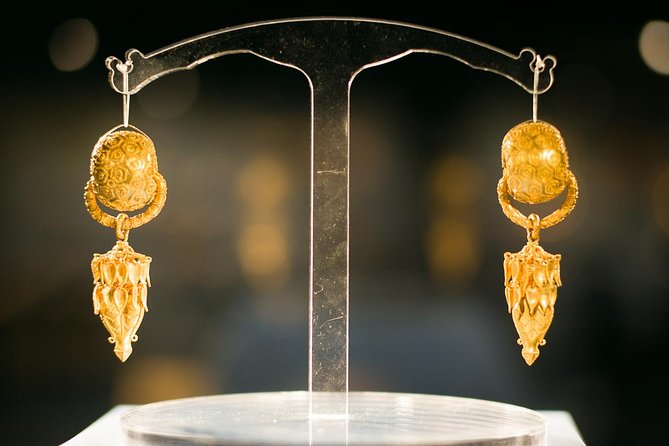
The ancient origins of Busan can be traced back to a time when early settlements began to emerge in the region. The history of excavation and archeological findings in Busan provide valuable insights into the early development of the city.
Excavations in various areas of Busan have uncovered artifacts and evidence that date back thousands of years, revealing a rich and diverse cultural history. Archeological findings include pottery, tools, and burial sites, shedding light on the daily lives and customs of the ancient inhabitants.
These discoveries have allowed historians to piece together the story of Busan’s early civilizations and their interactions with neighboring regions. The history of excavation in Busan continues to uncover new discoveries, contributing to our understanding of the city’s ancient origins.
Interested in history? More Busan historical sites we've covered
Bokcheon Museum: Preserving History
Continuing our exploration of Busan’s ancient origins, we now turn our attention to the Bokcheon Museum, a remarkable institution dedicated to preserving the rich history of the city. The museum not only showcases artifacts from Busan’s past, but also plays a crucial role in the preservation of its cultural heritage.
Here are some key aspects of the Bokcheon Museum’s work:
Architectural Design: The museum itself is a testament to the blending of modern and traditional architectural styles. Its sleek and contemporary design seamlessly integrates with the surrounding landscape, creating a harmonious space for visitors to enjoy history.
Excavation Process: The museum actively participates in archaeological excavations, uncovering hidden treasures and shedding light on the city’s ancient past. Its team of experts carefully excavates and preserves artifacts, ensuring their longevity and enabling future generations to learn from them.
Preservation Efforts: Through meticulous conservation practices, the Bokcheon Museum ensures that the artifacts in its collection are protected and maintained for future generations to appreciate. This includes proper storage, restoration, and research to enhance our understanding of Busan’s history.
The Bokcheon Museum’s commitment to architectural design and the excavation process highlights its dedication to preserving and promoting Busan’s historical legacy.
Beomeosa Temple: A Spiritual Haven
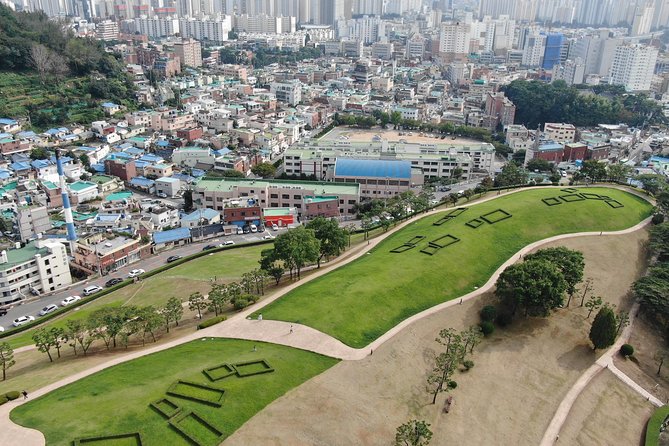
Nestled amidst the lush greenery of Busan, Beomeosa Temple beckons visitors with its serene ambiance and spiritual allure. This ancient Buddhist temple, founded in 678 AD, is known for its architectural beauty and religious practices.
The temple complex is a harmonious blend of traditional Korean design and natural surroundings, creating a tranquil atmosphere that invites contemplation and reflection. The main hall, Daeungjeon, is a masterpiece of Buddhist architecture, adorned with intricate carvings and vibrant paintings. Visitors can also explore the temple’s various buildings, including the Geukrakjeon Hall and the Sanshin-gak, dedicated to the mountain god.
Beomeosa Temple isn’t only a place of worship but also a cultural and historical landmark that showcases the rich heritage of Busan.
Cultural Significance
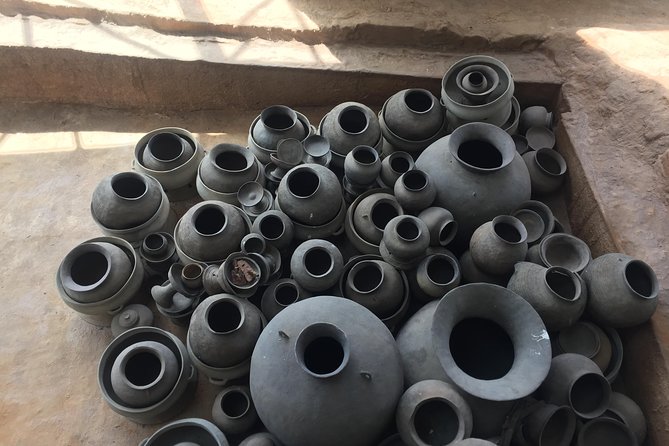
With its rich history and architectural splendor, Beomeosa Temple holds a significant cultural role in the heritage of Busan.
- Beomeosa Temple is a symbol of the city’s cultural traditions, showcasing the deep-rooted Buddhist practices that have been passed down through generations.
- The temple’s architectural beauty is a testament to the skilled craftsmanship of the time, with intricate carvings and vibrant colors adorning its structures.
Visitors to Beomeosa Temple can enjoy the serene atmosphere and witness the various cultural rituals and ceremonies that take place, offering a glimpse into the spiritual traditions of the region.
The temple’s cultural significance goes beyond its religious importance, as it serves as a living museum, preserving and showcasing the cultural heritage of Busan.
Its timeless beauty and cultural significance make it a must-visit destination for locals and travelers alike.
Notable Artifacts
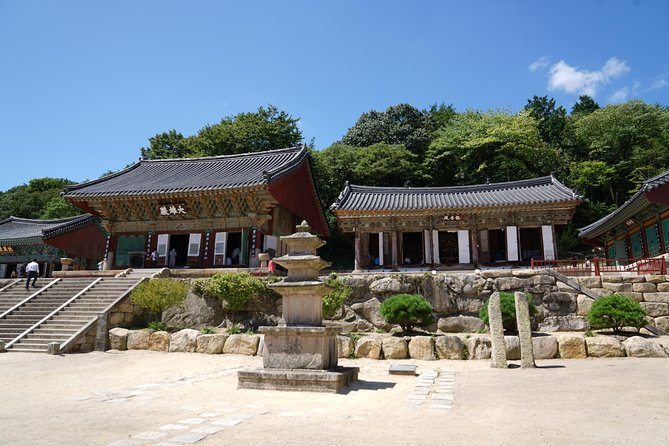
Notable artifacts within Beomeosa Temple offer a captivating glimpse into the rich history and cultural heritage of Busan. These archaeological discoveries hold immense historical significance, shedding light on the religious practices and artistic achievements of the past.
One such artifact is the Goryeo-era stone pagoda, known as the ‘Three-story Stone Pagoda of Beomeosa Temple.’ This exquisite piece stands at a height of 4.9 meters and is adorned with intricate carvings depicting various Buddhist figures and scenes.
Another notable artifact is the Beomeosa Temple Bell, a bronze bell dating back to the Joseon Dynasty. This bell, weighing over 4 tons, is renowned for its craftsmanship and is considered a national treasure.
Lastly, the Beomeosa Temple’s Daeungjeon Hall houses a collection of Buddhist paintings, showcasing the skill and artistry of ancient Korean painters.
These artifacts collectively contribute to the preservation and appreciation of Busan’s cultural heritage.
Like museums? Other Busan cultural attractions we've reviewed
Modern-day Relevance
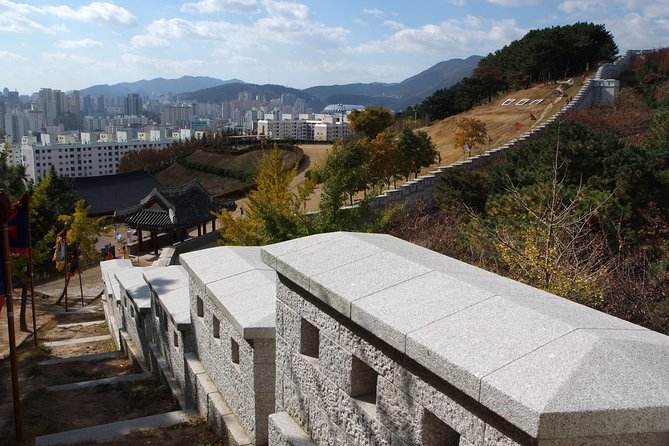
The rich history and cultural heritage of Busan, as showcased through notable artifacts such as the Goryeo-era stone pagoda and the Beomeosa Temple Bell, continue to hold immense modern-day relevance.
Modern day preservation: These artifacts serve as tangible reminders of Busan’s past, and their preservation is crucial in maintaining a connection to the city’s history and identity. The Bokcheon Museum plays a vital role in safeguarding these artifacts for future generations to appreciate and learn from.
Spiritual practices: Beomeosa Temple, with its centuries-old traditions and spiritual practices, remains a place of significance for locals and visitors alike. The temple offers a sanctuary if you’re after solace, peace, and a deeper connection with their spirituality. It serves as a beacon of tranquility amidst the bustling city and continues to attract people from all walks of life.
The modern-day relevance of these artifacts and spiritual practices highlights the importance of preserving and celebrating Busan’s rich cultural heritage.
Common Questions
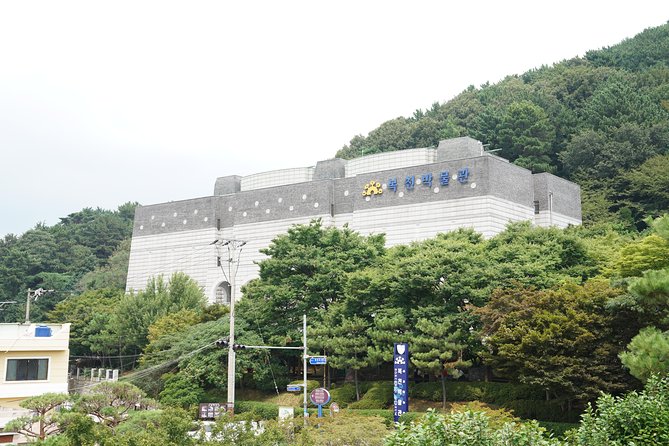
What Is the Admission Fee for Visiting the Bokcheon Museum and Beomeosa Temple?
The admission fee for visiting the Bokcheon Museum and Beomeosa Temple is not specified. It is recommended to check the official websites or contact the sites directly for the most up-to-date information on fees and any photography restrictions. Guided tours are available at both sites, and visitors should adhere to the dress code when visiting Beomeosa Temple. Plus, souvenir shops or gift stores may be present at the sites for visitors to explore.
Are There Any Restrictions on Photography Inside the Bokcheon Museum and Beomeosa Temple?
Photography restrictions are in place at both the Bokcheon Museum and Beomeosa Temple. This is to ensure the preservation of the cultural heritage housed within these sites, highlighting the importance of respecting and protecting our history.
Is There a Dress Code for Visiting the Beomeosa Temple?
There is a dress code for visiting Beomeosa Temple. Visitors are expected to dress modestly and cover their shoulders and knees. This dress code is important to respect the religious and cultural significance of the temple.
Are There Any Guided Tours Available at the Bokcheon Museum and Beomeosa Temple?
Yes, guided tours are available at the Bokcheon Museum and Beomeosa Temple. Visitors can join these tours to learn more about the history and significance of these cultural landmarks.
Are There Any Souvenir Shops or Gift Stores at the Bokcheon Museum and Beomeosa Temple?
Yes, there are souvenir shops and gift stores available at the Bokcheon Museum and Beomeosa Temple. Visitors can explore these shops to find unique mementos and gifts to take home as a reminder of their visit.
The Sum Up
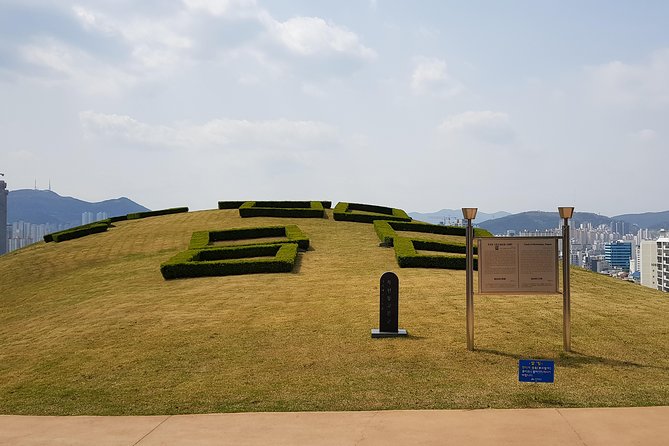
To sum it up, the Bokcheon Museum and Beomeosa Temple in Busan offer a captivating glimpse into the city’s rich history and cultural heritage.
Through their impressive collections and serene surroundings, these landmarks provide visitors with a deeper understanding of the ancient Silla Kingdom and the spiritual traditions of South Korea.
Whether you’re interested in archaeology or seeking a place for reflection, these sites aren’t to be missed when exploring the vibrant city of Busan.
More Museum Tours in Busan
More Historical Tours in Busan
- From Busan: Gyeongju Historical Day Tour with Sky Capsule
- From Busan: Echoes of Silla Gyeongju Historical Day Tour
- From Busan: Gyeongju Full-Day Historical Tour
- UNESCO World Heritage Gyeongju & Busan Two-city Private Tour.
- Echoes of Silla Gyeongju Historical Guided Day Tour from Busan
- From Busan: Echoes of Silla Gyeongju Historical Day Tour
More Tour Reviews in Busan
- Perfect Private Busan Tour for Families, Couples, Friends, Solo
- Authentic Busan Full-Day City Highlights Tour
- Busan K-Drama Tour in Busan for Private Tour
- Private Airport, Train Station & Hotel Transfer Service in Busan
- Private Full-Day Busan Tour with Personal Driver
- Busan: Jagalchi Market & Gamcheon Village Walking Tour With Guide
Looking for something different? Other Busan activities we've written about
- Authentic Busan Full-Day City Highlights Tour
- Busan K-Drama Tour in Busan for Private Tour
- Private Airport, Train Station & Hotel Transfer Service in Busan
- Private Full-Day Busan Tour with Personal Driver
- Busan: Jagalchi Market & Gamcheon Village Walking Tour With Guide
- Private Tour Gamcheon CultureVillage & Busan City Tour
- Explore Craft Beer at Beer Phobe Tasting Class in Busan
- Busan Full-Day City Tour with Gamcheon Village, Sea Temple & more
- Colors of Busan: Sky Capsule, Jagalchi Market & Night Views
- Busan Gukje Market Shared Minivan Tour
- Busan’s Best: Sea Temples, Yacht Tour & Sky Capsule Day Tour
- Moonlight Busan Culture and Coastal Lights Tour
